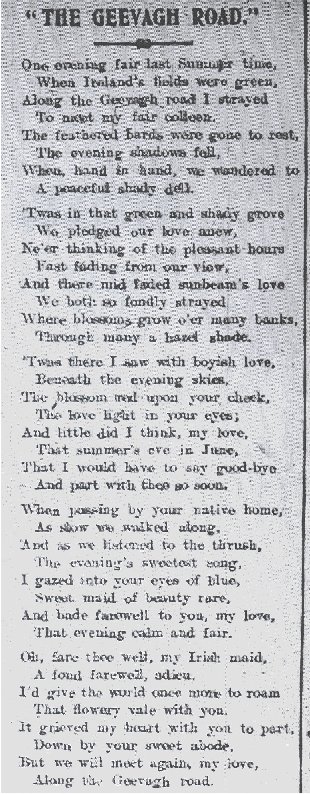Main menu:
Sligo Poets 1912-1923
The Geevagh Road
Sligo Newspapers > Sligo Champion

Michael J. Kearns (1886-1967)
Michael J. Kearns, popularly known as the ‘bard of Geevagh’, was a poet of no mean ability. He was born in Carrownadargny in 1886, the son of John Kearns, by his wife Mary McCormack, He was educated at St James's Well N.S. and, subsequently, became apprenticed to the bar and grocery business in Dublin, At the age of twenty he emigrated to Glasgow but returned to his native Geevagh on the outbreak of the World War in 1914. He worked for some time in a Boyle hotel before returning to Glasgow in 1920. Apart from occasional visits home he spent the remainder of his life in Scotland. In later years he became well known as the owner of a number of licensed premises and these became popular meeting places for many an Irish exile. He died in Glasgow in October, 1967, aged eighty-one years.
Although Michael Kearns had been scribbling verse from his schoolboy days, it was not until he had reached manhood that he embarked on poetry writing seriously. His finest poems, inspired by the memory of the sights and scenes of his childhood, were written in exile, and a number have been published from time to time in both the Sligo Champion and the Roscommon Herald. A talented poet, he could seize on an old custom, or on a local or national event, and weave it into a rousing ballad of sweet and melodious verse.
John C. McTernan, Worthies of Sligo (Sligo, 1994)
This poem is a disappointing example of this poet's word. It is a standard emigrant's lament of the ballad type describing both the girl and the landscape left behind. Apart from the title and its repetition there are no local references, this scene could be in any county of Ireland. There are no clever or unusual rhymes. The abode/road rhyme is used twice.
Geevagh is a parish in south east County Sligo. John McTernan's book mentioned above contains a number of Kearns' poems as does Aspects of Geevagh & Highwood, County Sligo published in 1996 by the Lough Arrow Research Project. Many of those other poems contain references to places and scenes atound Geevagh.
Sligo Champion March 9, 1912
The Geevagh Road
One evening fair last Summer time,
xxxxxWhen Ireland’s fields were green,
Along the Geevagh road I strayed
xxxxxTo meet my fair colleen.
The feathered bards were gone to rest,
xxxxxThe evening shadows fell,
When, hand in hand, we wandered to
xxxxxA peaceful shady dell.
‘Twas in that green and shady grove
xxxxxWe pledged our love anew,
Ne’er thinking of the pleasant hours
xxxxxFast fading from our view,
And then ’mid faded sunbeam’s love
xxxxxWe both so fondly strayed
Where blossoms grow o’er many banks,
xxxxxThrough many a hazel shade.
’Twas there I saw with boyish love,
xxxxxBeneath the evening skies,
The blossom red upon your cheek,
xxxxxThe love light in your eyes;
And little did I think, my love,
xxxxxThat summer’s eve in June,
That I would have to say good-bye
xxxxxAnd part with thee so soon.
When passing by your native home,
xxxxxAs slow we walked along,
And we listened to the thrush,
xxxxxThe evening’s sweetest song,
I gazed into your eyes of blue,
xxxxxSweet maid of beauty rare,
And bade farewell, to you my love,
xxxxxThat evening calm and fair.
Oh, fair thee well my Irish maid,
xxxxxA fond farewell, adieu,
I’d give the world once more to roam
xxxxxThat flowery vale with you.
It grieved my heart with you to part,
xxxxxDown by your sweet abode,
But we will meet again, my love,
xxxxxAlong the Geevagh road.
Yes, I’ll come back again, sweet maid
xxxxxAcross the stormy sea
And many another evening hour
xxxxxI’ll pass again with thee,
Where flowers grow and streamlets flow
xxxxxAround your sweet abode,
We’ll roam again with brighter love,
xxxxxAlong the Geevagh road.
xxxxxxxxxxxxxxxxxxMICHAEL J. KEARNS.
Glasgow (late of Geevagh.)
